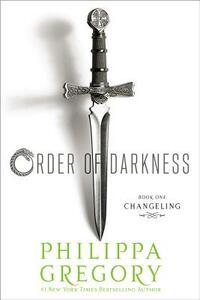Take a photo of a barcode or cover
I love history and I've loved every Philippa Gregory book I've read so far yet this one I didn't like that much. Changeling is set in Italy but as a reader you don't learn much about the customs in Italy in the fifteenth century. This book focusses on the characters and their adventures.
I also didn't like how religion played such a huge role in this book. I think religion is super interesting, doesn't matter what religion it is, but in this book it was everywhere. Something I did like is that this book doesn't focus on the romance. There's little to no romance in Changeling and it's refreshing.
I also didn't like how religion played such a huge role in this book. I think religion is super interesting, doesn't matter what religion it is, but in this book it was everywhere. Something I did like is that this book doesn't focus on the romance. There's little to no romance in Changeling and it's refreshing.
Apparently I read this three years ago. I have absolutely no memory of this, and a flip through the book reveals nothing. I don't remember the names of the characters, the plot, setting, nothing. This must be the most mundane book if I don't remember a word of it, but I've bought it (again) so I suppose I'll give it a go. This is so weird.
I enjoy Philippa Gregory's historical novels for adults. However, she does not make a good transition to YA. Without the structure of a historical figure's life, she meanders about, not able to move the story along. It also seems as if she as the plots of two novellas pasted to each other, so that when one story ends and you think the book should be over, it launches off into another direction.
It's a shame, I so wanted to like this book.
It's a shame, I so wanted to like this book.
Depois do estrondoso sucesso da série "A Guerra dos Primos", Philippa Gregory decidiu arriscar e apostou numa série completamente imaginada.
"A Ordem das Trevas" retrata a vida de Luca Vero - um rapaz que ficou "orfão" quando era demasiado novo para assimilar fosse o que fosse e que entrou para um convento como aprendiz - e de Isolde - uma rapariga nobre que foi criada no maior luxo e aprendeu desde sempre a acatar as ordens do pai.
Luca é nomeado inquisidor e percorre o país há procura de acontecimentos sobrenaturais (mais tarde estes acontecimentos ficaram conhecidos como Inquisição). E é quando chega a um convento em que se relata a existência de um "demónio" que está a deixar as freiras loucas e com chagas no corpo que conhece Isolde.
Isolde sempre foi a menina do papá mas depois da morte deste descobre que, no seu testamento, o pai ordenou que, se ela não se casasse com um homem escolhido pelo seu irmão (ou por ele) teria de se tornar Madre Abadessa do convento que pertencia a sua família. Depois da chegada de Isolde ao convento começam a acontecer coisas estranhas e ela e a sua fiel amiga Ishraq são declaradas culpadas por bruxaria.
Com uma escrita fácil e leve, Philippa Gregory leva-nos até aos tempos medievais em que o que não era "normal" era encarado como bruxaria e logo destruído.
Claro que esta série não está no mesmo nível que "A Guerra dos Primos" ou até dos outros livros da escritora, mas penso que têm muito potencial para agarrar muitos leitores, principalmente pessoas mais jovens e que ainda estejam a dar os primeiros passos na leitura.
"A Ordem das Trevas" retrata a vida de Luca Vero - um rapaz que ficou "orfão" quando era demasiado novo para assimilar fosse o que fosse e que entrou para um convento como aprendiz - e de Isolde - uma rapariga nobre que foi criada no maior luxo e aprendeu desde sempre a acatar as ordens do pai.
Luca é nomeado inquisidor e percorre o país há procura de acontecimentos sobrenaturais (mais tarde estes acontecimentos ficaram conhecidos como Inquisição). E é quando chega a um convento em que se relata a existência de um "demónio" que está a deixar as freiras loucas e com chagas no corpo que conhece Isolde.
Isolde sempre foi a menina do papá mas depois da morte deste descobre que, no seu testamento, o pai ordenou que, se ela não se casasse com um homem escolhido pelo seu irmão (ou por ele) teria de se tornar Madre Abadessa do convento que pertencia a sua família. Depois da chegada de Isolde ao convento começam a acontecer coisas estranhas e ela e a sua fiel amiga Ishraq são declaradas culpadas por bruxaria.
Com uma escrita fácil e leve, Philippa Gregory leva-nos até aos tempos medievais em que o que não era "normal" era encarado como bruxaria e logo destruído.
Claro que esta série não está no mesmo nível que "A Guerra dos Primos" ou até dos outros livros da escritora, mas penso que têm muito potencial para agarrar muitos leitores, principalmente pessoas mais jovens e que ainda estejam a dar os primeiros passos na leitura.
Only got to page 33, it wasn't really grabbing me. I'm not going to keep going since I've read some reviews that suggest it's not worth it.
adventurous
medium-paced
Plot or Character Driven:
Plot
Strong character development:
Complicated
Loveable characters:
Yes
Diverse cast of characters:
Yes
Cute story. Charlie Cox does a great job of narrating the audiobook! I was expecting more high fantasy, but that could be user error in interpreting the book's description.
I should have known better than to pick up a Philippa Gregory book. Her grasp of history is tenuous, and she has next to no understanding of how people relate to one another. But the back cover looked so enticing, with talk of secret societies and magic and werewolves! It would be hard to make those things uninteresting, right?
WRONG.
The main characters are flat, boring, and- quite frankly- incredibly stupid. For all that they're described as being intelligent, they don't display it at all.
The plot is told to us through fairly lengthy exposition. In fact, most of what happens is described in dialogue form. The worst example of this was someone describing in dialogue the abbey that the main character had just entered, followed by a drawn map of the simple building.
The intrigue and drama? Barely there, and what is there is dull.
Basically... just don't read it. Avoid at all costs. Save yourself!
And for our final proof, this novel, set in 1453, opens with the line: "The hammering on the door shot him into wakefulness like a hand-gun going off in his face."
WRONG.
The main characters are flat, boring, and- quite frankly- incredibly stupid. For all that they're described as being intelligent, they don't display it at all.
The plot is told to us through fairly lengthy exposition. In fact, most of what happens is described in dialogue form. The worst example of this was someone describing in dialogue the abbey that the main character had just entered, followed by a drawn map of the simple building.
The intrigue and drama? Barely there, and what is there is dull.
Basically... just don't read it. Avoid at all costs. Save yourself!
And for our final proof, this novel, set in 1453, opens with the line: "The hammering on the door shot him into wakefulness like a hand-gun going off in his face."




